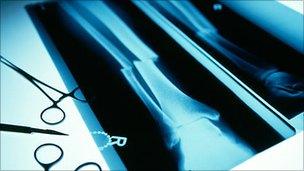Commissioning groups 'concerned' about size and budgets
- Published

A survey of the groups due to take over commissioning NHS care is highlighting fears about their size and budgets.
The questions were answered by 131 leaders, out of 253 new Clinical Commissioning Groups (CCGs).
A third said they felt under pressure to become larger, and two-thirds expressed fears that they might inherit debt.
The Department of Health said it expected parts of the NHS to work together to resolve any deficits.
The survey was organised by NHS Alliance and the National Association of Primary Care, which have joined forces to represent CCGs, who will take over buying and organising NHS services.
36% of GPs and other leaders who responded to the survey said they were under pressure from NHS managers to become bigger, so they could pass a viability test next month.
And 67% suspect they will have to deal with some legacy debt from former primary care trusts (PCTs) when the new system begins in England in April 2013.
Dr Michael Dixon, who heads the NHS Alliance, said: "Having a board with other clinical representatives and allowing for audit will be expensive.
"So the CCGs need to reach a critical mass in terms of size. But there's a risk of ending up recreating the old system of 150 primary care trusts.
'Double whammy'
"We're very concerned about the possibility of debts. My GP leaders don't want to be in the position of decommissioning services.
"It's been accepted that the CCGs shouldn't inherit deficits. But in practical terms, the squeeze on NHS finances is greater than people realise.
"Savings can be made in reducing referrals by GPs - but that won't achieve all the efficiencies that are needed.
"So there's concern not just about deficits but also the ongoing savings that are needed - and whether the CCGs will have sufficient budgets. It could be a double whammy."
Dr Dixon defended the idea of GPs taking a more active role in rationing treatment under the new system.
He said: "The NHS isn't some sort of soup kitchen where everyone can just pile in.
"GPs have always had to be responsible for the use of NHS resources, and to think about balancing them against the greater good.
"People are presenting this as a brave new world - but it's something we're doing anyway.
"Rationing is the duty of every patient, commissioner and manager - or we won't have a sustainable NHS."
No 'right' size
Dr Dixon said though that he agreed with the British Medical Association that GPs should not receive bonuses for saving money.
A Department of Health spokesman denied officials were being prescriptive about the size of CCGs.
He said: "There are widespread variations in the size and population coverage of PCTs and there is no single 'right' size."
"CCGs will not be responsible for PCT debt that arose before this current financial year.
"During 2011/12 and 2012/13, we expect PCT clusters, PCTs and developing CCGs to work together to resolve PCT deficits."
- Published20 November 2010
- Published21 June 2011